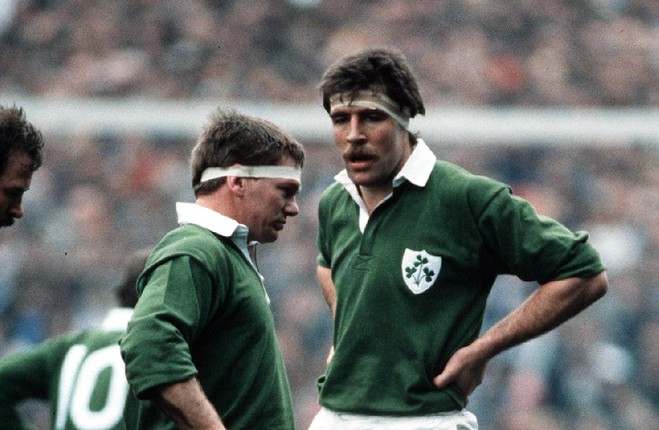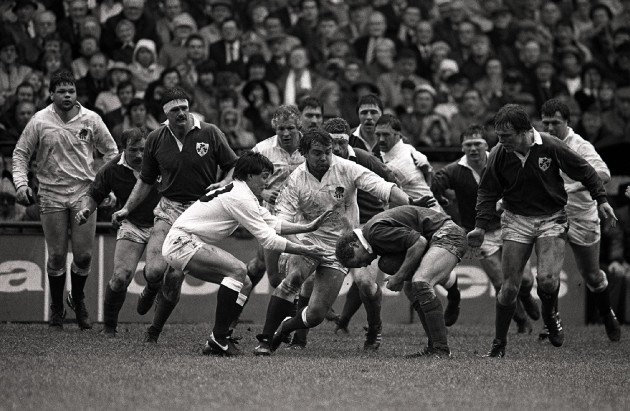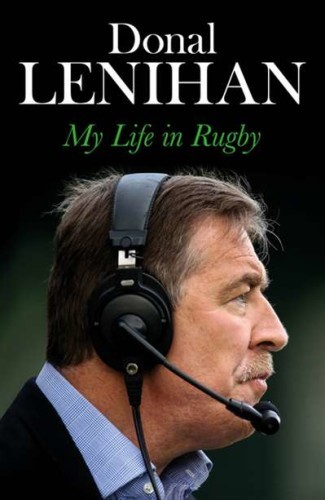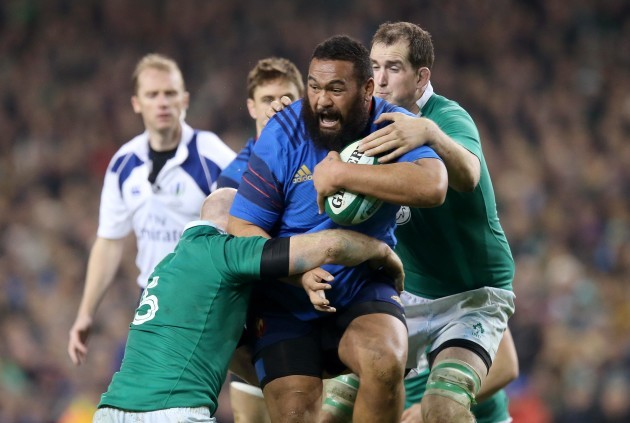THE GAME HAS changed. It’s an inescapable theme in Donal Lenihan’s absorbing autobiography, ‘My Life In Rugby’.
Long after he finished up his excellent career though, the Corkman remains deeply connected to the sport, in both its 20th and 21st century forms.
We meet Lenihan in the foyer of the Shelbourne Hotel, a fitting venue as it has housed so many Ireland internationals and provides the background to Lenihan’s thoughts in the lead-up the the ’82 Triple Crown decider.
Lenihan’s book is about more than rugby however.
“Rugby has been a huge part of my life, but some of the milestones and successes have been tempered with personal sadness,” he writes. Among the difficulties, the unspeakably tragic death of his daughter Sarah at just eight and a half months old and his son John who took his last breath little more than a day after his first.
In a month when rugby hasn’t needed any help to be put in perspective, there are many more incidents among Lenihan’s tales which make the oval ball game seem extremely unimportant.
Lenihan played from 1981 to 1992; a time in Irish history which extremely volatile with ‘The Troubles’ continuing apace. Being an Irish international rugby player at that time placed you smack bang in the middle of all the emotional fall-out, and Lenihan bears brilliant witness to the difficulties of Ulster’s contingent within a squad which was determined to be all inclusive even if there were tricolour and Union Jack-clad outside forces who would have preferred them to be fractured.
The lock looks back at the stories of men like Nigel Carr, whose career – and very nearly his life – was ended when he was caught up in a car-bombing. Or Brian McCall, who went to work as a forensic expert feeling he’d be an easy target for Republican snipers, and Jimmy McCoy who left the camp after receiving word of an IRA death threat just a fortnight after a mortar attack in Newry had killed nine RUC officers and injured 37 people.
The Corkman captained Ireland at the birth of the modern game, the 1987 World Cup, before one unsatisfactory anthem Ireland’s Call was employed to satisfy the militant extremes from both sides. He stood, angrily, to salute his flag to the Rose of Tralee, and also to no anthem at all. He sang songs for northmen, southmen, comrades all.
Now 57, he walks with a heavy limp as he leads the way to a quiet corner of a Shelbourne bar and that familiar deep voice comes to discuss the less-romantic modern game and how he has seen it change from his vantage point in the gantry.
“Rugby is more open and more available to kids around Ireland than it was when I started playing. It was confined to more of the elite schools, apart from in Munster and particularly Limerick where everyone played.
“Now, the thing that fascinates me driving round Ireland: you can’t go through a parish without seeing a GAA pitch, but now there is a rugby club within touching distance of most young players.
“Any kid with an aspiration to play rugby, there is certainly an opportunity to do that. I also think that because it’s a professional game now, kids have the desire to play. Because they see heroes on television and that the majority of Irish players are playing for their local province. So you can go to the RDS, Thomond Park or the Sportsground and you can touch these players.”
Rugby’s popularity though, brings notoriety as the other edge on the sword. The game is in the spotlight more and more, and not always for good reasons.
Increased physicality in the professional game has gone hand-in-hand with concussion awareness. So, for every few children who want to play rugby, there is a parent who might rather they didn’t.
On the same day we spoke with Lenihan, there was also time to chat with Donnacha O’Callaghan. Both former Munster locks – speaking completely separately – felt that a rule change may be needed to improve the game lest it crumble under its own weight.
“I’d personally have an issue with the fact that we now have eight subs coming in off the bench,” says Lenihan.
“That has allowed you to carry players of 23-24 stone, who only have the capacity to play rugby for 20-25 minutes. The damage they do coming in for the last 15 minutes… if you’re not absolutely perfect in the technique of the tackle,and obviously as you fatigue, that happens, that’s when the dangers come.
“I think if you had fewer substitutions, you’d be inclined to have more athletes on your bench, you can cover the fact that players get injured.
“Nowadays, you can get up to six forwards which means you could change three quarters of your pack through the course of a game. That’s an issue that needs to be addressed, certainly we’ve sacrificed skill for bulk and power whereas New Zealand have gone the other way.
“The beauty about rugby is that we can play in a number of different ways.”
Lenihan has watched and enjoyed them all, but is also a first-hand witness to the fact that it remains just a game.




